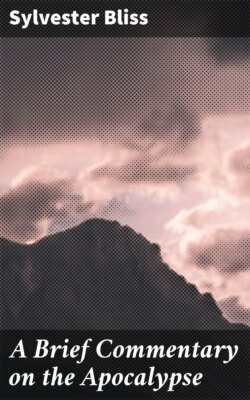Читать книгу A Brief Commentary on the Apocalypse - Sylvester Bliss - Страница 12
На сайте Литреса книга снята с продажи.
Epistle to the Church in Pergamos.
ОглавлениеTable of Contents
And to the messenger of the congregation in Pergamos write: These things saith He who hath the sharp two-edged sword: I know thy works, and where thou dwellest, even where Satan's throne is; and thou holdest fast my name, and hast not denied my faith, even in those days in which Antipas was my faithful witness: who was slain among you, where Satan dwelleth. But I have a few things against thee, because thou hast there those, who hold fast the doctrine of Balaam, who taught Balak to cast an enticement to sin before the children of Israel: to eat idol-sacrifices, and to commit fornication. So thou hast also those, who hold fast the doctrine of the Nicolaitanes, in like manner. Repent; or else I will come to thee quickly, and will fight against them with the sword of my mouth. He, who hath an ear, let him hear what the Spirit saith to the congregations: To him, who overcometh, I will grant to eat of the hidden manna, and will give him a white stone, and on the stone a new name written, which no one knoweth, but he, who receiveth it.—Rev. 2:12–17.
“He which hath the sharp sword with two edges,” is the one who walked in the midst of the seven golden lamp-stands—out [pg 038] of whose “mouth went a sharp two-edged sword,” 1:16. This identifies him as the one who was followed by the armies of heaven, when “the remnant were slain with the sword of him that sat upon the horse: which sword proceeded out of his mouth,” 19:21. “The sword of the Spirit … is the word of God,” Eph. 6:17. “He shall smite the earth with the rod of his mouth, and with the breath of his lips shall he slay the wicked,” Isa. 11:4. The One who indites this epistle is thus designated, probably, because, unless they repented of the things alleged against them, he would fight against them with the sword of his mouth.
The church of Pergamos had refrained from apostasy, although situated in a wicked and corrupt city—even where Satan reigned almost supreme and received the obedience of its inhabitants. They had been faithful in those days when Antipas, a faithful Christian, and probably the former pastor of the church, was slain (Dr. Hales thinks) in Domitian's persecution, in AD 94. Yet, the Lord had some things against them.
The doctrine of Balaam is what that prophet counselled Balak to cast as a stumbling-block before Israel: For “the people began to commit whoredom with the daughters of Moab. And they called the people unto the sacrifices of their gods; and the people did eat and bowed down to their gods. And Israel joined [pg 039] himself unto Baal-peor,” Num. 25:1–3. And Moses said of the women of Midian, “Behold, these caused the children of Israel, through the counsel of Balaam, to commit trespass against the Lord in the matter of Peor,” Ib. 31:16. This was also, probably, the same as the doctrine of the Nicolaitanes, p. 34.
The “hidden manna” seems to be a reference to that hidden in the ark, where it was laid up before the Lord (Ex. 16:33), in memory of what was sent for the sustenance of Israel in the wilderness, where “man did eat angel's food,” Ps. 78:25. The law having a shadow of good things to come (Heb. 10:1), the manna hidden in the ark may be typical of the angelic sustenance to be revealed in the future world. The Saviour said, “Verily, verily, I say unto you, He that believeth on me hath everlasting life. I am that bread of life. This is the bread which cometh down from heaven, that a man may eat thereof, and not die,” John 6:47, 48, 50.
The “white stone” has received divers interpretations. In ancient trials, the votes of the judges were given by white and black pebbles. The former signified acquittal, and the latter condemnation. Conquerors in public games sometimes received a white stone with their name inscribed on it, which entitled them, during the remainder of their life, to be maintained at the public expense. Persons were sometimes invited to feasts or banquets, [pg 040] by the presentation of a white stone, with their name on it in connection with that of their hosts. The possession of the white stone evidently entitles the possessor to all the privileges of the heavenly inheritance.
The “new name” is unknown to all but its possessor; who, on its possession, becomes a child of God, and will receive, saith God, “in my house and within my walls, a place and a name better than of sons and of daughters: I will give them an everlasting name that shall not be cut off,” Isa. 56:5. The Saviour has promised that “him that overcometh will I make a pillar in the temple of my God, and he shall go no more out: and I will write upon him the name of my God, and the name of the city of my God, which is new Jerusalem, which cometh down out of heaven from my God; and I will write upon him my new name,” Rev. 3:12. And his new “name” “no man knew but he himself,” Ib. 19:12.
Pergamos still contains a few thousand inhabitants.
